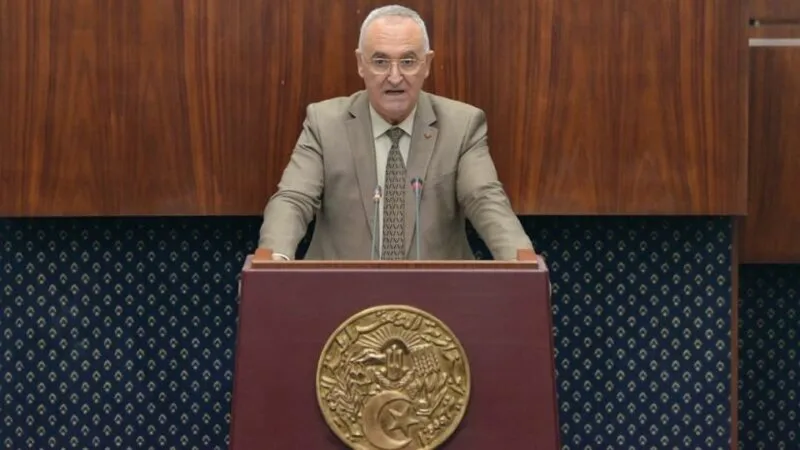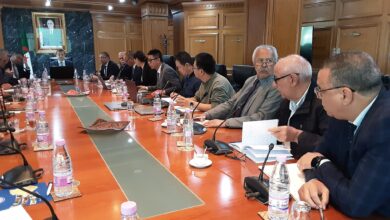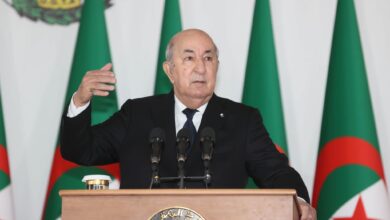Fayed: Algeria has achieved “encouraging results” in the field of financial services and banking coverage – Algerian Dialogue

The Minister of Finance, Aziz Fayed, confirmed today, Thursday in Algiers, that the financial sector has recorded “encouraging results” in the field of improving the quality of services and enhancing banking coverage compared to previous years in order to devote financial inclusion, and this is a result of the efforts of financial institutions in this field, urging more efforts to be made. Efforts by keeping pace with developments occurring internationally.
Mr. Fayed explained in his speech during the opening of a media day on financial inclusion and savings organized by the Association of Banks and Financial Institutions that the number of banking agencies increased to 1,734 agencies by the end of 2023, with 6,500 points of sale for insurance institutions, in addition to more than 4,000 agencies affiliated with the Algeria Post, highlighting that It is about spaces that “provide financial services through which we strive daily to enhance financial inclusion.”
This meeting, organized in partnership with the Federation of Insurance and Reinsurance Companies, and the National Economic, Social and Environmental Council, came under the slogan “Encouraging savings to enhance financial inclusion,” coinciding with the celebration of the Arab Financial Inclusion Day, which falls on April 27.
Mr. Fayed added that an increase has also been recorded in the number of savings accounts to 12 million accounts by the end of the year 2023, with a total amount exceeding 3,600 billion Algerian dinars, pointing out that “these numbers are encouraging compared to previous years, thanks to the great efforts made by most financial institutions to improve… The quality of services reaches the required levels.”
In this regard, he called for the need to enhance the use of modern means of digitization and artificial intelligence due to their high efficiency and their ability to change the nature of classical financial services, to develop the quality of financial transactions, which have become more innovative, to add transparency, and to reduce service costs to achieve financial inclusion and economic development.
Financial inclusion is defined as the ability for individuals and institutions to access financial products and services easily and at reasonable prices, in a way that meets their needs, especially transactions, payments, savings and loan products, and insurance services, in a sustainable manner.
Mr. Fayed returned to the efforts that were made several years ago to provide the appropriate climate for developing the country’s economic and financial system by ratifying the electronic commerce law and updating the monetary and banking law, in addition to creating the government authority for electronic certification, highlighting that the establishment of the National Housing Bank “is one of the building blocks of the reform that Through it, we seek to accompany citizens and all sectors.”
While emphasizing the importance of financial culture in developing financial inclusion in Algeria, the Minister explained that financial institutions seek, within the framework of the National Program for Financial Culture, to sensitize and guide all segments of society, especially youth and children in schools, training institutes, and universities, in many topics related to the field of banking and insurance. Throughout the year to allow the consumer to know his rights and duties towards banks, insurances and financial institutions.
— Resources collected from banks increased to 14.917 billion dinars —
In the same context, Mr. Fayed urged the importance of working to activate the field of marketing and communication in order to explain financial products and services and promote all financial products by involving the media and communication, which play a pivotal role in conveying information.
For his part, Governor of the Bank of Algeria, Salah Eddine Taleb, stressed the importance of saving in general for the financial system of any economy and its role in financing investments, adding, on the other hand, that the resources collected by banks active in the arena by the end of 2023 rose by 2.66 percent to reach 14.917 billion dinars, compared to 14.530 dinars. Billion late 2022.
According to the numbers reviewed by Mr. Taleb, deposits outside the hydrocarbon sector also increased by 4.24 percent at the end of last year compared to 2022, while time deposits recorded a temporary increase from 7.585 billion DZD at the end of 2022 to 8012 billion DZD in December 2023, i.e. an increase of 5.63 percent. .
As for the resources obtained by banks within the framework of Islamic banking activity, they continued the pace of growth, recording an increase from 445 billion DZD in 2021 to 554 billion DZD in 2022, then to 678 billion DZD at the end of 2023, with a “very noticeable increase of 25 percent in 2022 and then 22 percent in 2023.” According to the Bank of Algeria.
After urging banking institutions to move forward in developing and diversifying their products and services, which is one of the main incentives for developing savings, Mr. Taleb explained that the latter is one of the factors in consolidating financial inclusion and that “the quality of banking services is the main lever for developing savings, especially since the monetary law and The banker gives a special place to the principle of protecting savers and depositors.”
In the same context, the Governor of the Central Bank continued by saying that activating saving “will inevitably increase the banking of the national economy and thus improve the effectiveness of monetary policy,” adding that saving is “a fundamental pillar of economic stability and prosperity in the long term.”
In turn, Mrs. Rabia Kharfi, President of the National Economic, Social and Environmental Council, stressed in her intervention the strides made by Algeria in the field of developing its financial sector, especially by modernizing the legal and legislative frameworks, enhancing digitization and developing tools for financing the economy, especially through the stock exchange, highlighting that Financial inclusion “is a moral and economic necessity and constitutes a necessary element for promoting social justice and reducing disparities, as well as promoting sustainable development.”
Mrs. Kharfi also pointed out that financial inclusion has become firmly established in the economic scene and a tangible element in the various transactions provided to citizens, adding that one of the advantages of financial inclusion is improving the relationship between citizens, institutions, and the business climate.
#Fayed #Algeria #achieved #encouraging #results #field #financial #services #banking #coverage #Algerian #Dialogue
#oussama_boulegheb #elhiwardz #alakhibariat.xyz #elhiwar #elhiwar-en



